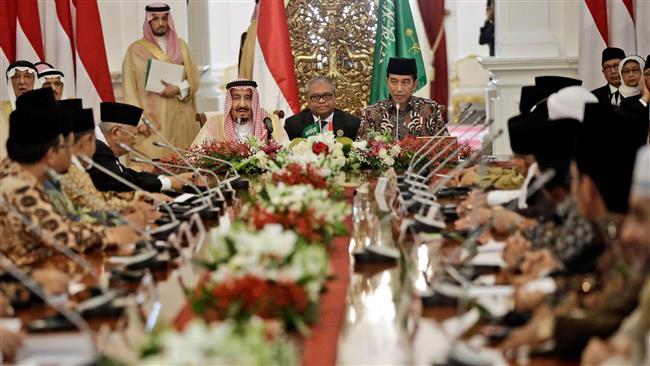
RNA - King Salman arrived in Jakarta Wednesday on the second leg of his luxurious month-long Asia tour, which has already taken him to Malaysia and will also see him going to China, Japan and the Maldives.
The Saudi king plans a 12-day stay in the world's largest Muslim-majority country. The trip is the first by a Saudi monarch to Indonesia in almost 50 years.
The 81-year-old Saudi ruler is accompanied by at least 1,500 people -- including 10 ministers, 25 princes and 800 delegates -- who traveled to Indonesia on 36 different flights over a period of three weeks, the Indonesian news agency Antara reported.
Adji Gunawan, the president of the airport services company, PT Jasa Angkasa Semestar, told the Jakarta Post that the Saudi king had 459 tonnes of equipment, including two Mercedes-Benz S600s and two electric lifts.
The firm said 63 tonnes of King Salman’s cargo would be unloaded in Jakarta and 396 tonnes would be taken to Bali.
The last time a Saudi king visited Indonesia was in 1970, when Faisal bin Abdulaziz Al Saud met former Indonesian president, Mohamed Suharto, on his state visit to Jakarta.
On Wednesday, King Salman and Indonesia's President Joko Widodo oversaw the signing of 11 agreements on security and infrastructure development.
The visit has been widely seen as an attempt by Riyadh to attract investment in a bid to save its ailing economy. Saudi finances have been hit by falling oil prices and the costs of the kingdom's military aggression against neighboring Yemen.
The lavish spending stands in stark contrast to a fiscal austerity program being implemented by the new Saudi rulers back home.
Indonesians rap Saudi abuse of migrant workers
On Thursday, people held a protest outside the Saudi embassy in Jakarta to condemn violence against Indonesian migrant workers in the kingdom.
The demonstrators held placards and umbrellas reading, “Stop Violence,” “World Peace” and “Stop violence against migrants.” At least, one protester was arrested during Thursday’s rally.
Saudi Arabia has come under fire for rampant abuse of migrant workers and their forced deportations. The country hosts around 9 million migrant workers, which account for more than half its workforce.
847/940